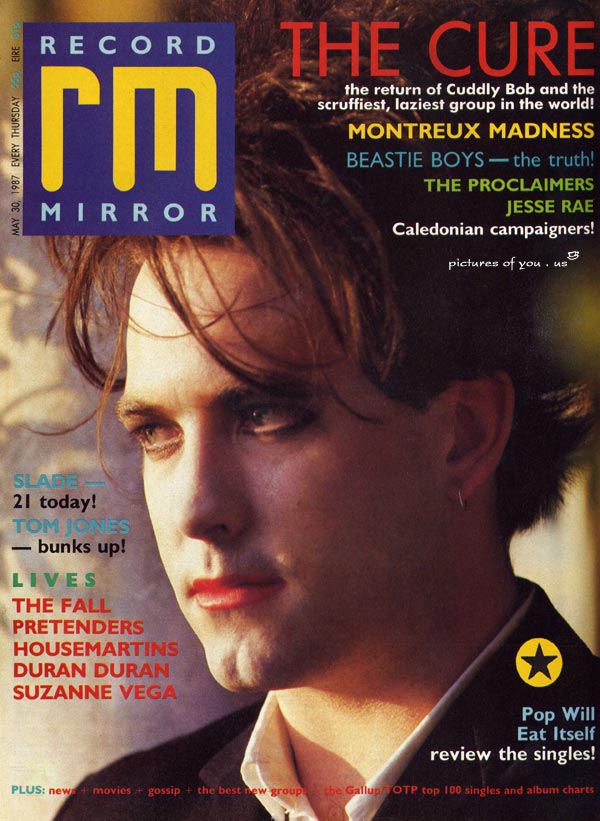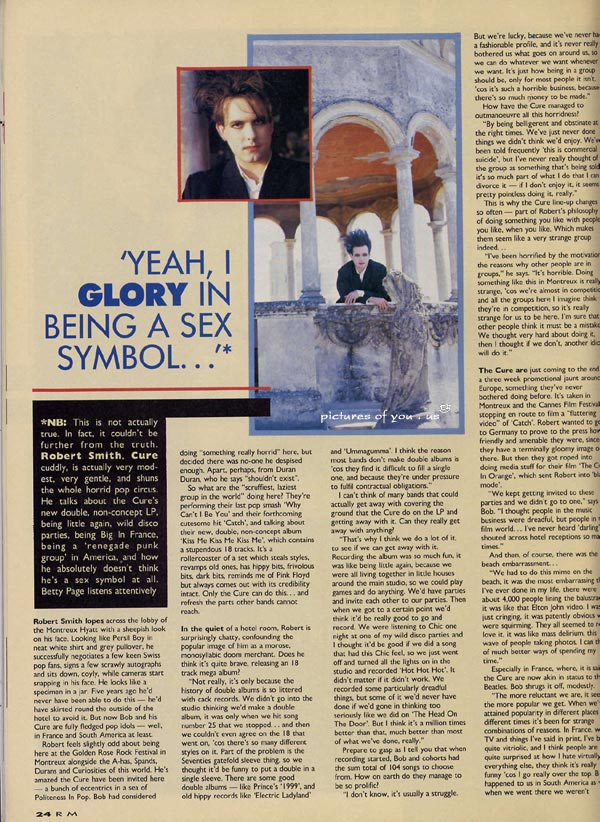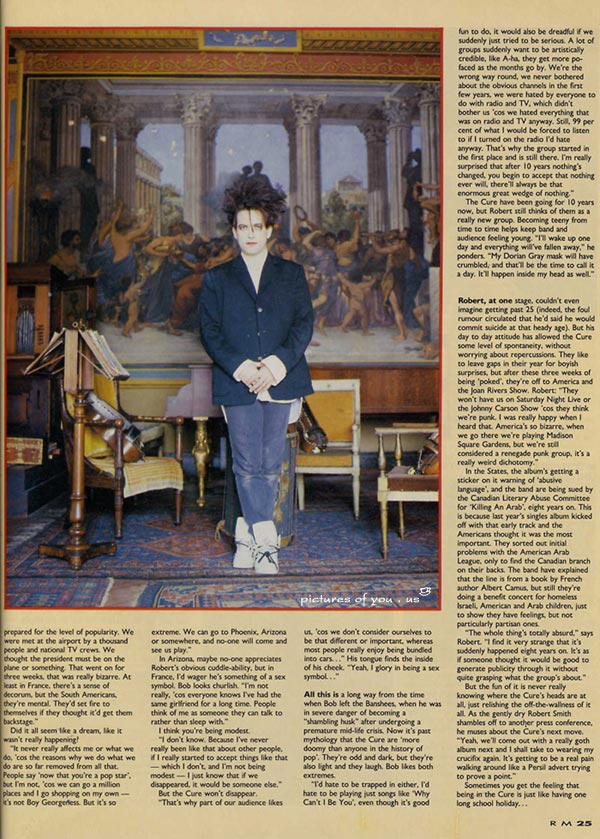"Yea, I Glory in being a Sex Symbol"



5-30-87 Record Mirror (UK)
"Yea, I Glory in being a Sex Symbol"



May 1987 by Betty Page
Record Mirror
*NB: This is not actually true. In fact, it couldn't be further from the truth. Robert Smith, Cure cuddly, is actually very modest, very gentle, and shuns the whole horrid pop circus. He talks about the Cure's new double, non-concept LP, being little again, wild disco parties, being Big In France, being a 'renegade punk group' in America, and how he absolutely doesn't think he's a sex symbol at all. Betty Page listens attentively.
Robert Smith lopes across the lobby of the Montreux Hyatt with a sheepish look on his face. Looking like Persil Boy in neat whit shirt and grey pullover, he successfully negotiates a few keen Swiss pop fans, signed a few scrawly autographs and sits down, coyly, while cameras start snapping in his face. He looks like a specimen in a jar. Five years ago he'd never have been able to do this - he'd have skirted round the outside of the hotel to avoid it. But now Bob and his Cure are fully fledged pop idols - well, in France and South America at least.
Robert feels slightly odd about being here at the Golden Rose Rock Festival in Montreux alongside the A-has, Spandau, Duran's and Curiosities of this world. He's amazed the Cure have been invited here -a bunch of eccentrics in a sea of Politeness In Pop. Bob had considered doing "something really horrid" here, but decided there was no-one he despised enough. Apart, perhaps, from Duran Duran, who he says "shouldn't exist".
So what are the "scruffiest, laziest group in the world" doing here? They're performing their last pop smash "Why Can't I be You" and their forthcoming cutesome hit "Catch" and talking about their new, double, non-concept album "Kiss Me Kiss Me Kiss Me", which contains a stupendous 18 tracks. It's a rollercoaster of a set which steals styles, revamps old ones, has hippy bits, frivolous bits, dark bits, reminds me of Pink Floyd but always comes out with its credibility intact. Only the Cure can do this... and refresh the parts other bands cannot reach,
In the quiet of a hotel room, Robert is surprisingly chatty, confounding the popular image of him as a morose, monosyllabic, doom merchant. Does he think it's quite brave, releasing an 18 track mega album?
"Not really, it's only because the history of double album is so littered with cack records. We didn't go into the studio thinking we'd make a double album, it was only when we hit song number 25 that we stopped... and then we couldn't even agree on the 18 that went on, 'cos there's so many different styles on it. Part of the problem is the Seventies gatefold sleeve thing, so we thought it'd be funny to put a double in a single sleeve. There are some good double albums - like Prince's '1999', and old hippy records like 'Electric Ladyland' and 'Ummagumma'. I think the reason most bands don't make double albums is 'cos they find it difficult to fill a single one, and because they're under pressure to fulfill contractual obligations."
I can't think of many bands that could actually get away with covering the ground that the Cure do on the LP and getting away with it. Can they really get away with anything?
"That's why I think we do a lot of it, to see if we can get away with it. Recording the album was so much fun, it was like being little again, because we were all living together in little houses around the main studio, so we could play games and do anything. We'd have parties and invite each other to our parties. Then when we got to a certain point we'd think it'd be really good to go and record. We were listening to Chic one night at one of my wild disco parties and I thought it'd be good if we did a song that had this Chic feel, so we just went off and turned all the lights on in the studio and recorded 'Hot Hot Hot'. It didn't matter if it didn't work. We recorded some particularly dreadful things, but some of it we'd never have done if we'd gone in thinking too seriously like we did on 'The Head On The Door'. But I think it's a million times better than that, much better than most of what we've done, really."
Prepare to gasp as I tell you that when recording started, Bob and cohorts had the sum total of 104 songs to choose from. How on earth do they manage to be so prolific?
"I don't know, it's usually a struggle. But we're lucky, because we've never had a fashionable profile, and it's never really bothered us what goes on around us, so we can do whatever we want whenever we want. It's just how being in a group should be, only for most people isn't, 'cos it's such a horrible business, because there's so much money to be made."
How have the Cure managed to outmanoeuvre all this horridness?
"By being belligerent and obstinate at the right times. We've just never done things we didn't think we'd enjoy. We've been told frequently 'this is commercial suicide', but I've never really thought of the group as something that's being sold, it's so much part of what I do that I can't divorce it - if I don't enjoy it, it seems pretty pointless doing it, really."
This is why the Cure line-up changes so often - part of Robert's philosophy of doing something you like with people you like, when you like. Which makes them seem like a very strange group indeed...
"I've been horrified by the motivation, the reasons why other people are in groups." he says. "It's horrible. Doing something here in Montreux is really strange, 'cos we're almost in competition, and all the groups here I imagine think they're in competition, so it's really strange for us to be here. I'm sure that other people think it must be a mistake. We thought very hard about doing it, then I thought if we don't, another idiot will do it."
The Cure are just coming to the end of a three weeks promotional jaunt around Europe, something they've never bothered doing before. It's taken in Montreux and the Cannes Film Festival, stopping en route to film a 'flattering video' of 'Catch'. Robert wanted to go to Germany to prove to the press how friendly and amenable they were, since they have a terminally gloomy image over there. But then they got roped into doing media stuff for their film 'The Cure In Orange', which sent Robert into 'blank mode'.
"We kept getting invited to these parties and we didn't go to one," says Bob. "I thought people in the music business were dreadful, but people in the film world... I've never heard 'darling' shouted across hotel receptions so many times."
And then, of course, there was the beach embarrassment...
"We had to do this mime on the beach, it was the most embarrassing thing I've ever done in my life, there were about 4,000 people lining in the balustrades, it was like that Elton John video. I was just cringing, it was patently obvious we were squirming. They all seemed to really love it, it was like mass delirium, this big wave of people taking photos. I can think of much better ways of spending my time."
Especially in France, where, it is said, the Cure are now akin in status to the Beatles, Bob shrugs it off, modestly.
"The more reluctant we are, it seems the
more popular we get. When we've attained popularity in difference places at
different times it's been for strange combinations of reasons. In France, with
TV and things I've said in print, I've been quite vitriolic, and I think people
are quite surprised at how I hate virtually everything else, they think it's
really funny 'cos I go really over the top. But it happened to us in South
America as well, when we went there we weren't prepared for the level of
popularity. We were met at the airport by a thousand people an national TV
crews. We thought the president must be on the plane or something. That went on
for three week,
that was really bizarre. At least in France, there's a sense of decorum, but the
South American, they're mental. They'd set fire to themselves if they thought
it'd get them backstage."
Did it all seem like a dream, like it wasn't really happening?
"It never really affects me or what we do, 'cos the reasons why we do what we do are so far removed from all that. People say 'now that you're a pop star', but I'm not, 'cos we can go a million places and I go shopping on my own... it's not Boy Georgeness. But it's so extreme. We can go to Phoenix, Arizona or somewhere, and no-one will come and see us play."
In Arizona, maybe no-one appreciates Robert's obvious cuddle-ability, but in France, I'd wager he's something of a sex symbol. Bob looks churlish. "I'm not really, 'cos everyone knows I've had the same girlfriend for a long time. People think of me as someone they can talk to rather than sleep with."
I think you're being modest.
"I don't know. Because I've never really been like that about other people. If I really started to accept things like that - which I don't, and I'm not being modest - I just know that if we disappeared, it would be someone else."
But the Cure won't disappear.
"That's why part of our audience likes us, 'cos we don't consider ourselves to be that different or important, whereas most people really enjoy being bundled into cars..." His tongue finds the inside of his cheek. "Yeah, I glory in being a sex symbol..."
All this is a long way from the time when Bob left the Banshees, when he was in severe danger of becoming a "shambling husk" after undergoing a premature mid-life crisis. Now it's past mythology that the Cure are 'more doomy than anyone in the history of pop'. They're odd and dark, but they're also light and they laugh. Bob likes both extremes.
"I'd hate to be trapped in either, I'd hate to be playing just songs like 'Why can't I be you', even though it's a good fun to do, it would be also dreadful if we suddenly just tried to be serious. A lot of groups suddenly want to be artistically credible, like A-ha, they get more po-faced as the months go by. We're the wrong way round, we never bothered about the obvious channels in the first few years, we were hated by everyone to do with radio and TV, which didn't bother us 'cos we hated everything that was on radio and TV anyway. Still, 99 per cent of what I would be forced to listen to if I turned on the radio I'd hate anyway. That's why the group started in the first place and is still there. I'm really surprised that after 10 years nothing's changed, you begin to accept that nothing ever will, there'll always be that enormous great wedge of nothing."
The Cure have been going for 10 years now, but Robert still thinks of them as a really new group. Becoming teeny from time to time helps keep band and audience feeling young. "I'll wake up one day and everything will've fallen away," he ponders.. "My Dorian Gray mask will have crumbled, and that'll be the time to call it a day. It'll happen inside my head as well."
Robert, at one stage, couldn't' even imagine getting past 25 (indeed, the foul rumor circulated that he's said he would commit suicide at that heady age). But his day to day attitude has allowed the Cure some level of spontaneity, without worrying about repercussions. They like to leave gaps in their year for boyish surprised, but after these three weeks of being 'poked', they're off to America and the Joan Rivers show. Robert: "They won't have us on Saturday Night Live or the Johnny Carson Show 'cos they think we're punk. I was really happy when I heard that. America's so bizarre, when we go there we're playing Madison Square Garden, but we're still considered a renegade punk group, it's a really weird dichotomy."
In the States, the album's getting a sticker on it warning of 'abusive language', and the band are being sued by the Canadian Literary Abuse Committee for 'Killing an Arab', eight years on. This is because last year's singles album kicked off with that early track and the Americans thought it was the most important. They sorted our initial problems with the American Arab League, only to find the Canadian branch of their backs. The band have explained that the line is from a book by French author Albert Camus, but still they're doing a benefit concert for homeless Israeli, American and Arab children, just to show they have feelings, but not particularly partisan ones.
"The whole thing's really totally absurd." says Robert. "I find it very strange that it's suddenly happened eight years on. It's as if someone thought it would be good to generate publicity through it without quite grasping what the group's about."
But the fun of it s never really knowing where the Cure's heads are at all, just relishing the off-the-wallness of it all. As the gently dry Robert Smith shambles off to another press conference, he muses about the Cure's next move.
"Yeah, we'll come out with a really Goth album next and I shall take to wearing my crucifix again. It's getting to be a real pain walking around like a Persil advert trying to prove a point."
Sometimes you get the feeling that being in the Cure is just like having one long school holiday...